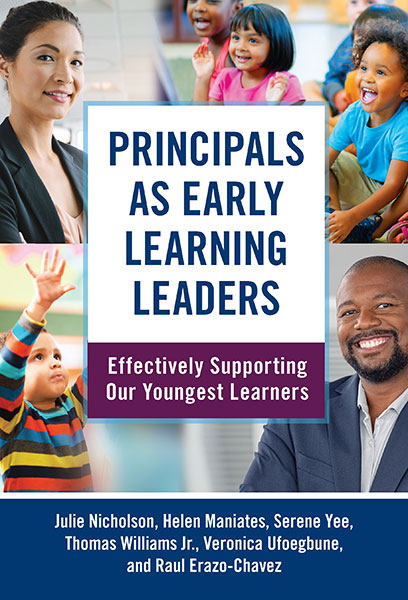Professors: Request an Exam Copy
Print copies available for US orders only. For orders outside the US, see our international distributors.
Julie Nicholson, Helen Maniates, Serene Yee, Thomas Williams, Veronica Ufoegbune, Raul Erazo-Chavez
Publication Date: January 27, 2022
Pages: 256
Series: Early Childhood Education Series

“Principals as Early Learning Leaders is imperative reading for any school leader working with our youngest students to ensure they better understand and implement sound practices.” —AASA School Administrator
The majority of public school principals are now required to supervise and evaluate early childhood teachers and classrooms, yet many do not have a sufficient understanding of child development and early childhood pedagogy to lead for equity. This practical and comprehensive resource addresses this critical gap by presenting current research on child development, an understanding of the elements of high-quality early childhood classrooms, essential information on trauma-responsive practices, and strategies for reducing bias and preventing the use of exclusionary discipline with young children.
School leaders learn about the pivotal role they can play in improving equity for young children, their families, and the early childhood workforce. Each chapter includes key takeaways and central questions that can be used for individual reflection or to guide group discussions. Authentic examples, illustrations, and actionable strategies help readers to successfully implement the content in their school.
Principals as Early Learning Leaders is essential reading for principals, vice principals, administrators, and others responsible for leading preschool and pre-K programs for equity.
Book Features:
Julie Nicholson is professor of practice in the School of Education at Mills College. Helen Maniates is associate professor of teacher education in the School of Education at the University of San Francisco. Serene Yee is an education programs consultant for the California Department of Social Services. Thomas Williams Jr. serves as an executive strategic policy analyst in the Kentucky Department of Education’s Office of Special Education and Early Learning. Veronica Ufoegbune has directed many publicly funded and non-profit early learning programs, including UC Berkeley’s childcare centers. Raul Erazo-Chavez is executive director of schools and programs in the Early Education Department within the San Francisco Unified School District.
“ Principals as Early Learning Leaders is imperative reading for any school leader working with our youngest students to ensure they better understand and implement sound practices.”
—AASA School Administrator
“Practical and comprehensive, Principals as Early Learning Leaders is essential reading for principals, vice principals, administrators, and others responsible for leading preschool and pre-K programs for equity.”
—Sir Read a Lot
“This terrific book by Julie Nicholson and colleagues offers a guide to the critical issues of early learning that all school leaders need to know in order to effectively support young children and their families. It is particularly notable for addressing salient issues of our time—including antiracist and antibias education, culturally responsive practices, and trauma-informed practices—in the context of an inclusive community of learners informed by the science of early learning. I recommend this thorough and thoughtful text about how to support teachers to teach in the ways children learn as a must-read for school leaders.”
—Beverly Falk, professor and program director, Graduate Programs in Early Childhood Education, The City College of New York
Contents
Introduction 1
Organization of the Book 3
1. The Urgent Need for Principals to Become Early Learning Leaders 5
Foundations of High-Quality Early Childhood Classrooms 6
The Need for Principals to Be Effective Early Learning Leaders 8
Six Competencies for Effective Instructional Leadership in Early Childhood 8
Increased Focus on Equity in Early Childhood 9
The Early Childhood Workforce 14
Principals as Bridge Builders 16
2. What Principals Need to Know About How Young Children Develop and Learn 19
Brain Development in the Early Childhood Years 19
Principles of Child Development and Learning 23
Young Children Learn in an Integrated Manner 25
Theories and Perspectives on Children’s Development and Learning 26
3. Understanding Identity and Inclusion in Early Childhood 38
Young Children’s Racial Identity Development 38
Young Children’s Gender Identity Development 41
Bilingual and Multilingual Development in the Early Years 50
Young Children With Disabilities and Developmental Delays 53
Inclusive Environments in Early Childhood Education 55
4. Understanding Toxic Stress and Trauma in Early Childhood 62
Healthy Versus Unhealthy Stress 63
Adverse Childhood Experiences (ACEs) 63
Early Experiences With Adversity Do Not Determine a Child’s Future 69
Defining Trauma 69
Neuroplasticity in the Early Years 77
Creating Trauma-Responsive Learning Environments and Schools 78
5. Understanding Curriculum in Early Childhood 81
Early Childhood Curriculum Looks Different From Elementary Curriculum 81
Curriculum Planning in Early Childhood 86
Different Approaches That Inform Curriculum in Early Childhood Education 90
Resisting a Standardized and Scripted Curriculum 112
6. Instruction in the Early Childhood Classroom 115
The Importance of Individualizing 115
Play as a Primary Context for Teaching and Learning 117
Play-Based Learning Across a Continuum 118
The Benefits of Play for Children’s Learning and Development 123
Different Types of Play That Support Learning and Development 124
Open-Ended Materials and Loose Parts 127
Outdoor Play 128
Play Is Disappearing 130
7. Creating a Caring Community of Learners 132
The Teaching Pyramid Model 132
Exclusionary Discipline in Preschool Classrooms 141
8. A Closer Look at Powerful Learning in Early Childhood Classrooms 148
Promoting Cognitive Development 148
Promoting Language Development and the Emergence of Literacy 156
Promoting Creativity and Artistic Expression 170
Promoting Antiracist, Antibias Education 170
Promoting Trauma-Responsive Practice 179
9. Assessment in Early Childhood 183
Characteristics of Effective Assessment Environments and Practices 184
Monitoring Young Children’s Growth and Development 189
One-Time “Snapshot” Assessments 197
Concerns With Standardized Testing in Early Childhood 198
Effective and Equitable Use of Assessment in Early Childhood Classrooms 200
Involving Parents and Families in Assessment 200
Conclusion 205
Appendix A: Conducting Effective Early Learning Walk-Through Observations 207
Appendix B: Professional Development for Principals to Learn About High-Quality Early Childhood Education 209
Appendix C: Resources 214
References 219
Index 235
About the Authors 247
Professors: Request an Exam Copy
Print copies available for US orders only. For orders outside the US, see our international distributors.